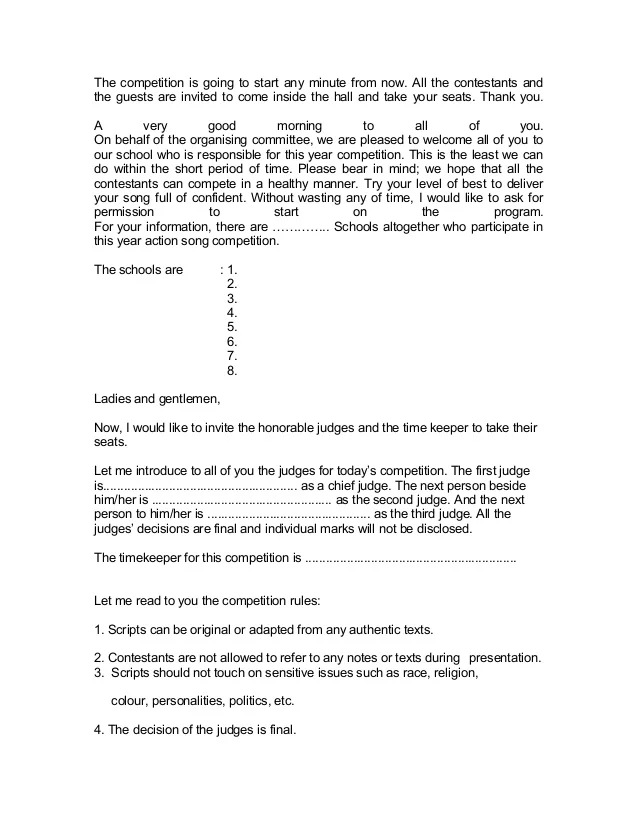Emcee Script Sample
Posted By admin On 19/05/19How to Emcee an Event. An emcee is the storyteller of the event. They connect each presenter or performer with the importance of the day, without taking the limelight. Anyone with leadership skills and some confidence can emcee an event.
Remain calm. Being an MC is a lot of pressure. The event’s success is largely contributed to how well the MC keeps things on track. While the event’s proceedings can get hectic, it is important to remain calm and focus on maintaining your MC persona. To keep your cool, try:- Continuing on if you mess up. Stopping will only make your mistake that much more obvious. Try to roll with the punches and continue on from your mistake. If you do this successfully, the audience will most likely forget your misstep.
- Finding a spot to look at while talking. Looking at the individual audience members might make you more nervous while speaking. Instead, try looking over the heads of the audience members to reduce intimidating one on one eye contact.
- Slowing down with your words. Nothing shows you’re more nervous as an MC, than talking too quickly. Talking too quickly can lead to mispronunciations and stuttering, which can affect people understanding you. Take your time, and pause slightly in between sentences.
If being chosen as a master of ceremonies is an honor, so is writing the speech--effectively doubling the pressure that accompanies the job. Like the master of ceremonies, or emcee, a good speechwriter must devise a succinct, punchy text that conveys the occasion, while entertaining the audience. A feel for words and language is equally critical to success at the job. However, if you have the verbal flair, writing a good emcee speech need not feel intimidating. With a little organization, and a good grasp of the basics, your speech will hold the audience on the edge of their seats.
Get The Basics Right
Consult the emcee beforehand, if possible, to learn whom they will be addressing, the type of occasion and the reason for their appearance. Even minimal knowledge of these factors beats having none at all, and greatly boosts your chances of writing a good memorable speech.
Set the tone for the emcee by writing a brief introduction. Include the emcee's name, as well as the title of their speech (if applicable) and the objectives, if they will appear at a seminar, corporate training session or other formal event. Keep your introduction at 30 to 60 seconds.This ensures a crisp, delivery that moves the speech along.
Follow a well-defined beginning, middle and end. Those points should be fully apparent to your audience and the emcee, particularly when the speaker pauses to deliver the next point. This is even more critical for seminars or training sessions, in which you will want the emcee to give a brief overview of the program.
Write in the active voice whenever possible, keeping subjects and verbs close together--saying 'I think' is more effective than its passive cousin, 'it is thought,' for example. Too many expressions in the passive voice--such as 'I have been,' 'this has,' or 'we were'--can bog down a speech in all the wrong places, and leave the audience shifting in its seats.


Sharpen The Fine Points
Vary the rhythms of your speech with a mixture of short and long phrases. Avoid overly technical terms or jargon, except in settings where everyone speaks it as a common language. Writing for the Association of Urban Planners calls for a different approach than a local politician speaking at a church banquet.
Do not be afraid to use cliches or repetitive phrases creatively to build a particular mood, or effect. This technique works especially well in political settings, in which the emcee might have to introduce several different people dedicating their energies to a single topic like health care reform, for example.
Always close your emcee's speech with a powerful example or anecdote that ties all the previous points together. This is important, since the audience wants to take one or two key moments home--and if they do, those impressions are better left near the end, where they matter most.
Run through the speech with your emcee before the big day, if possible, and tape it with a digital voice recorder, to hear how it flows overall. That will allow both of you to iron out any rough spots before the emcee hits the podium.
Tip
Avoid overly bombastic or combative language--even in political settings, a little humor goes a long way in getting the audience on the speaker's side.
Tailor your speech to the emcee's verbal patterns and speaking style. Even the best speaker will trip up if they are constantly confronting words they can barely pronounce, or expressions that sound visibly unfamiliar as the speech progresses.

Warning
Always write out difficult or unusual names and places phonetically on the emcee's note cards. This step will head off any embarrassing verbal slips or manglings of both items.